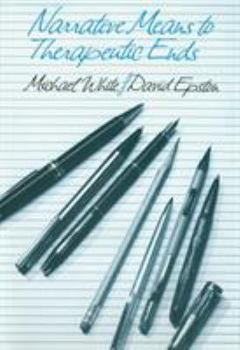Narrative Means to Therapeutic Ends
White and Epston base their therapy on the assumption that people experience problems when the stories of their lives, as they or others have invented them, do not sufficiently represent their lived experience. Therapy then becomes a process of storying or restorying the lives and experiences of these people. In this way narrative comes to play a central role in therapy. Both authors share delightful examples of a storied therapy that privileges a person's lived experience, inviting a reflexive posture and encouraging a sense of authorship and reauthorship of one's experiences and relationships in the telling and retelling of one's story.
Format:Hardcover
Language:English
ISBN:0393700984
ISBN13:9780393700985
Release Date:May 1990
Publisher:W. W. Norton & Company
Length:256 Pages
Weight:1.05 lbs.
Dimensions:1.1" x 5.7" x 8.5"
Customer Reviews
5 ratings
Narrative means and therapeutic uses
Published by Thriftbooks.com User , 16 years ago
Narrative means is the foundation for narrative therapy. This book provides the foundational theoretical and some clinical applications for narrative therapy. The major contribution is the role narrative therapists play in advocating for their clients as demonstrated in the use of letter writing. This approach challenges more traditional therapy models to be grounded in the lived experiences and communities of their clients as well as advocate for needed changes when necessary. This is a great and essential place to begin learning about narrative therapy.
Helpful and mindful book!
Published by Thriftbooks.com User , 16 years ago
It's great to couple this book with the Gerald Monk et al. book "Narrative therapy practices: The archaeology of hope". Both provide gentle, insightful introductions to this emerging counseling practice, and moreover, offer "real world" examples and exercises for group and individual practice.
Theoretical Understanding
Published by Thriftbooks.com User , 18 years ago
This book is a great resource for developing a theoretical understanding of narrative therapy. Specific techniques such as letter writing and certificates are described in detail. However, if you are looking for a how-to guide on narrative therapy, I would suggest "Playful approaches to serious problems: Narrative therapy with children and their families" by Freeman, J., Epston, D., & Lobvits, D. (1997).
A left hand turn in therapy (for the better).
Published by Thriftbooks.com User , 19 years ago
I was surprised to read the other negative reviews of this book. This book is, after all, the text which defined the philisophical underpinning of a new way of looking at expertise in therapy. Yes, much of the book, especially the discussion of Foucault's ideas, is hard going and at times requires a second or even third read. This is not a "how to" book. It is an invitation to a way of thinking about problems and their role in a life. It is a book about the transformative value of conversations, viewpoints and relationship. This book is not for sissies, but it is brilliant. Those who want a "narrative primer" should be able to find one elsewhere. However, they will be skipping the magic of transformative thought. Michael White and David Epston have unleased the power of alternatives for those oppressed by problems and by society. An amazing read!
The Starting Point of Narrative Therapy
Published by Thriftbooks.com User , 23 years ago
This is the book that started the current focus on narrative therapy. There are only four chapters in this book and each explains a large part of narrative counseling. One of the best chapters is on how the process of "externalizing" works. Another good chapter is about how writing letters and making documents for clients can be an effective therapy tool. Although this book is over ten years old, it is still the first book that someone should read when learning about narrative counseling.





